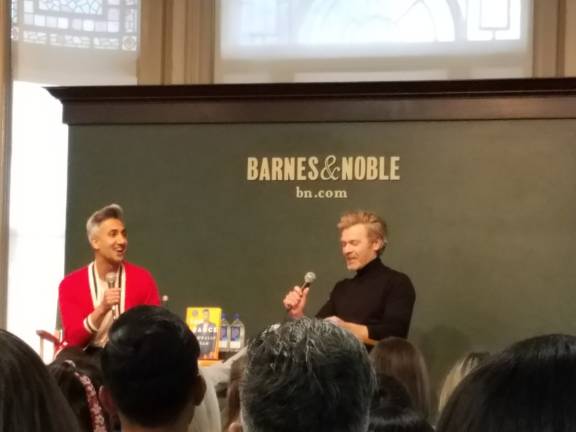Tan France on Love, Fashion and Politics

By Oscar Kim Bauman
Hundreds of people assembled at the Union Square Barnes and Noble store on June 4 for a talk by and photo-op with Tan France. France, a designer, and the fashion expert on Netflix’s rebooted “Queer Eye” series, was appearing to promote his memoir, “Naturally Tan,” which was released by St. Martin’s Press the following day.
Prior to the event, the anticipation was palpable; the seating was packed over half an hour prior to the scheduled start of 7:00 p.m., and the crowd erupted into cheers as France walked out. He told the audience that the identity of his interviewer for the evening’s talk was a surprise. The crowd whooped, while France quickly clarified, “It’s not one of the “Queer Eye” boys!”
Instead, the interviewer was France’s husband, Rob France, whom the former identified as “the original France.” The latter was making his first public appearance since his husband’s sudden rise to fame last year.
France explained how the book came to be and said that he initially “didn’t think I had a book in me.” However, he remembered why his husband initially encouraged him to take his role on “Queer Eye” in the first place: to provide representation for people like him, as he put it, “brown, British and gay.”
Through both “Queer Eye” and his book, France said that he aims to foster “a real sense of connection with people,” even those “who may hate people like me,” and to hopefully change their views. “I talk to people who have strange views on people like me. I want them to see me and realize ‘maybe my ideas are misinformed,’ he explained.
The talk then turned to the topic which begins the book: France’s youth. The child of Pakistani immigrants, he was born and raised in Doncaster, a town in northern England. France explained that despite less accepting views within his family and society at large, he “always knew I was going to marry a man.”
Despite this self-awareness of his sexuality, he made the choice to hide it from the world. Growing up in an overwhelmingly white town under the constant threat of racist violence, he “didn’t have room to worry about being beaten for being gay too.”
France explained, somberly, that “It took a long time to get out of that cycle and trust Caucasians when all you’ve known is violence.” Lightening the mood, he then joked, “I married a white man! I turned it all around.”
He advised the audience to “find a community that’s going to love you for everything you are,” pointing out that through social media “you have a community at your fingertips,” something which was not accessible during his pre-Internet small-town childhood.
While France maintained that the overall tone of his memoir is light and humorous, the interview took a dark turn as he brought up his book’s chapter on the September 11, 2001 attacks. When visiting the United States in the nearly two decades since the attacks, “24 times,” he sawwid “I was detained by Customs for several hours, asked the same questions,” even as a teenager in the early 2000s.
France emphasized that while honoring the memory of those killed on 9/11 is important, memory cannot be used to justify the racial profiling of all Middle Eastern, South Asian and Muslim people. The longer the paranoid atmosphere fostered by the war on terror continues, France said, “the longer my people are treated as terrorists.”
Speaking to the audience, but also seemingly to America as a whole, “the people you’re afraid of are the same people we’re afraid of” — that rather than being a potential terrorist, people like himself are also potential targets.
Shifting topics, France then recounted the story of how he met his husband. France was on vacation in Salt Lake City, Utah, and he wanted to experience the city’s dating scene. Though he wasn’t looking for a long-term relationship, he realized his connection with the man who would be his husband on their second date.
At the end of his talk, France told the audience to “brace yourself” for the upcoming return of “Queer Eye,” which was filmed in Japan. The formerly New York City-based show has since gone worldwide, and shifted filming to different regions of the United States — Georgia, Kansas, and Missouri were the settings of the first three seasons.
Despite this expansion, from France’s choice to kick off his book tour with back-to-back stops at the Union Square Barnes and Noble and the 92nd Street Y, to fellow “Fab Five” member Antoni Porowski’s opening of the Village Den restaurant in Greenwich Village last fall, “Queer Eye” remains connected to its New York roots.